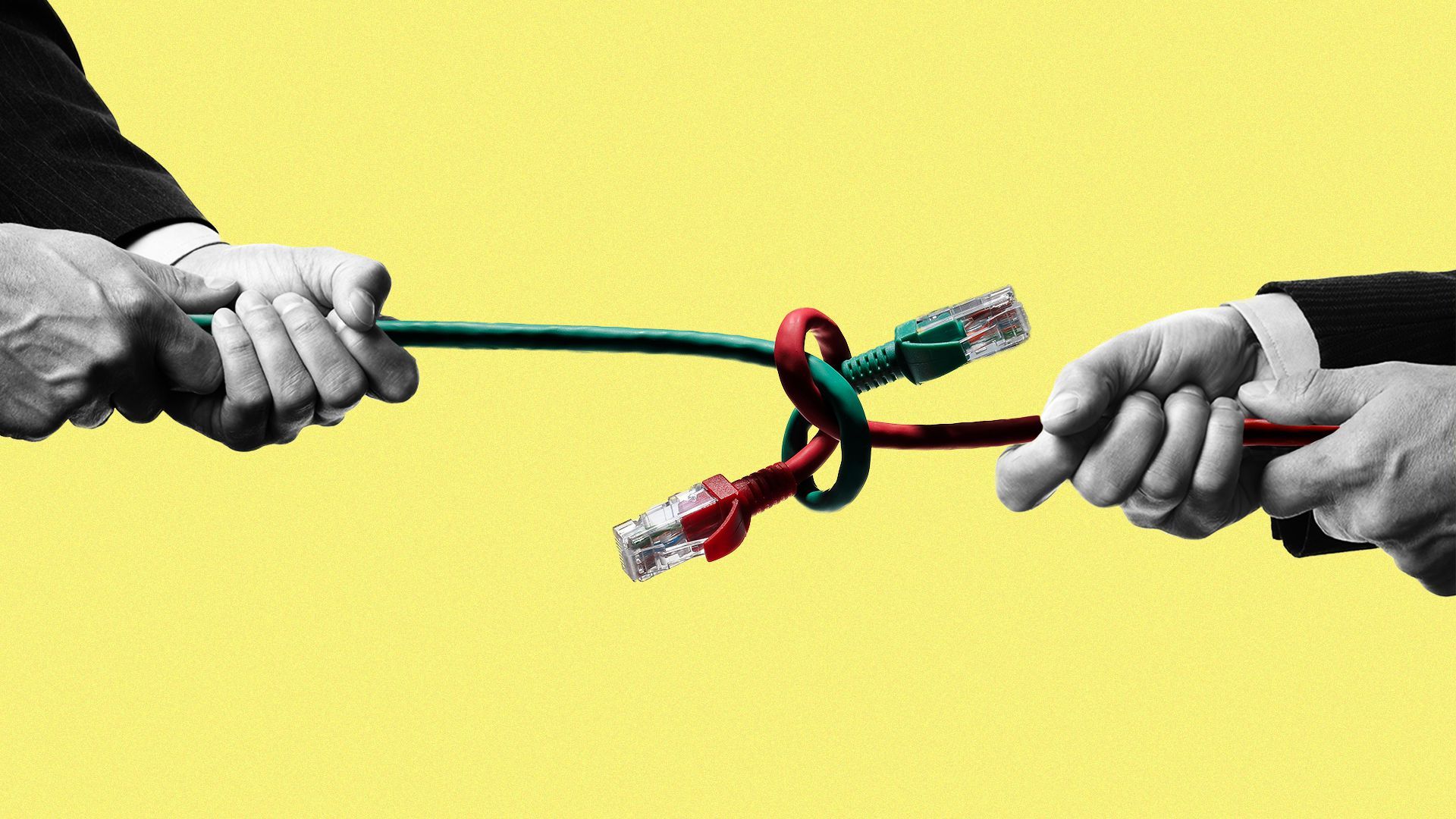Internet prices kick off Washington brawl
Add Axios as your preferred source to
see more of our stories on Google.

Shoshana Gordon/Axios
President Biden's promise to cut the price of Americans' internet bills has provoked a fierce lobbying campaign by cable and telecom companies to prove that the cost of broadband has already dropped.
Why it matters: Internet providers are desperate to fend off any move to regulate the prices they charge, while the government is increasingly viewing connectivity as an essential service.
State of play: Internet industry lobbyists are publicly touting studies showing a decline in prices, attacking reports that argue otherwise and telling members of Congress there's no need for new regulations because they already have affordable programs in place.
- “A lot of their focus has been to point to the products they’ve put in the marketplace, the actions they took during COVID and doing a lot of handwaving to say we did all these things for Americans, we kept you connected," a Democratic Hill staffer told Axios.
- "They’re absolutely on edge," another aide told Axios. "They are concerned at the highest levels over the prospect of rate regulation."
- Low-income broadband programs, which typically cost between $10 and $15 a month, have connected more than 14 million Americans over the past decade, according to an analysis from cable trade group NCTA.
- The catch: Most Americans don't qualify for those service plans. Biden's push to reduce prices goes beyond just helping the poorest users.
Details: Broadband prices are often opaque — promotions, bundle packages, data caps and equipment rental fees all make it very complicated to calculate how much Americans are paying for their internet service.
- “The challenge is — for a variety of reasons — there is really no uniform pricing practices among the big ISPs, nor is there any clear government requirement upon them to list the actual price," Jonathan Schwantes, senior policy counsel for Consumer Reports, told Axios.
The White House says Americans "pay too much for the internet" and President Biden intends to work with Congress to find a way to "reduce internet prices for all Americans."
- The administration pointed to a recent working paper from New York University finance professor Thomas Philippon that found Americans pay more for internet service than consumers in other countries.
- US internet companies "earn more per user and they pay much higher dividends than companies in other regions," Philippon told Axios.
And the White House isn't buying the push-back from industry groups.
- A senior administration official told Axios the bulk of the evidence shows prices have gone up recently and prices are higher than they are for comparable plans in Europe.
- Biden noted the high cost of internet service in March, and the official told Axios, "I don't think we've seen anything since he made those comments to make us feel like we were wrong about that. We're still committed to taking some bold action to make sure that we bring those prices down for folks."
The intrigue: The White House also highlighted a working paper from Berkeley Law professor Tejas Narechania.
- Narechania finds that broadband providers offer slower service for the same price in areas where they lack competition, and proposes a model statute for rate regulation of a basic tier broadband service in areas without competition.
- The senior administration official said the White House hasn''t taken a position on rate regulation, but noted, "It's pretty clear that it's something that the FCC could do under the existing statutes that it has in its jurisdiction."
The other side: Cable and telecom industry groups dispute many of the White House studies, and argue prices are dropping for U.S. customers.
- Cable trade group NCTA commissioned a paper from economists to review a study from New America's Open Technology Institute and others, and found that they overstate broadband prices.
- "These studies do not support calls for the regulation of U.S. fixed broadband internet access providers or other forms of government intervention intended to address a perceived lack of competition," the authors wrote.
- USTelecom did its own review of broadband prices last year and argues that Americans paid less in 2020 for the most popular speed tier than they did in 2015.
Yes, but: The White House also points to a report from progressive advocacy group Free Press that argues that broadband prices have risen, using a number of different data sources.
- Free Press cites a Bureau of Labor Statistics survey of consumer spending that found that households paid more for internet service in 2019 than in 2015. USTelecom attacked the report in a blog post this week.
- The BLS data comes from asking consumers what they pay for internet service.
- "What actually matters most to people is the price on the bill for the check they write every month," Derek Turner, Free Press research director, told Axios.
